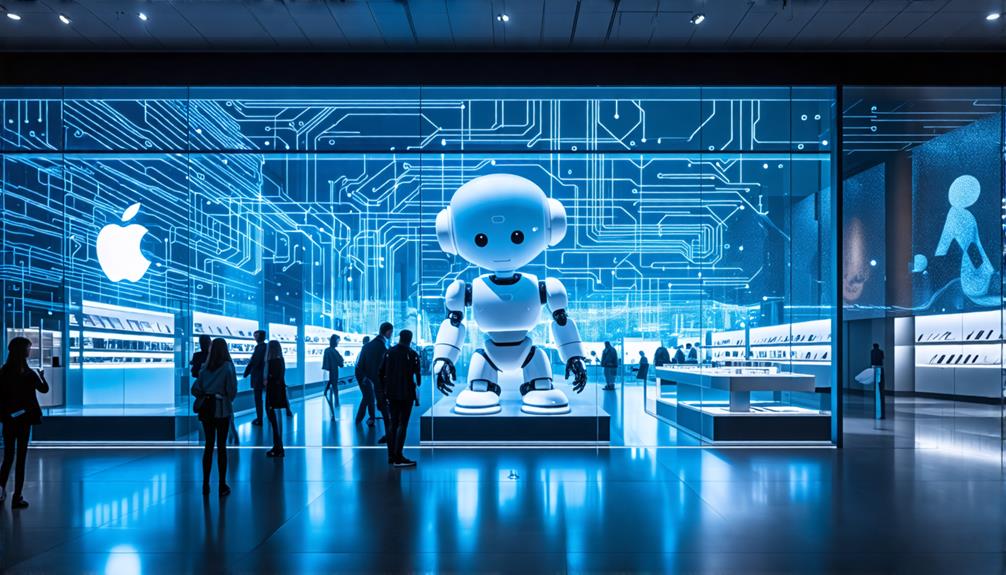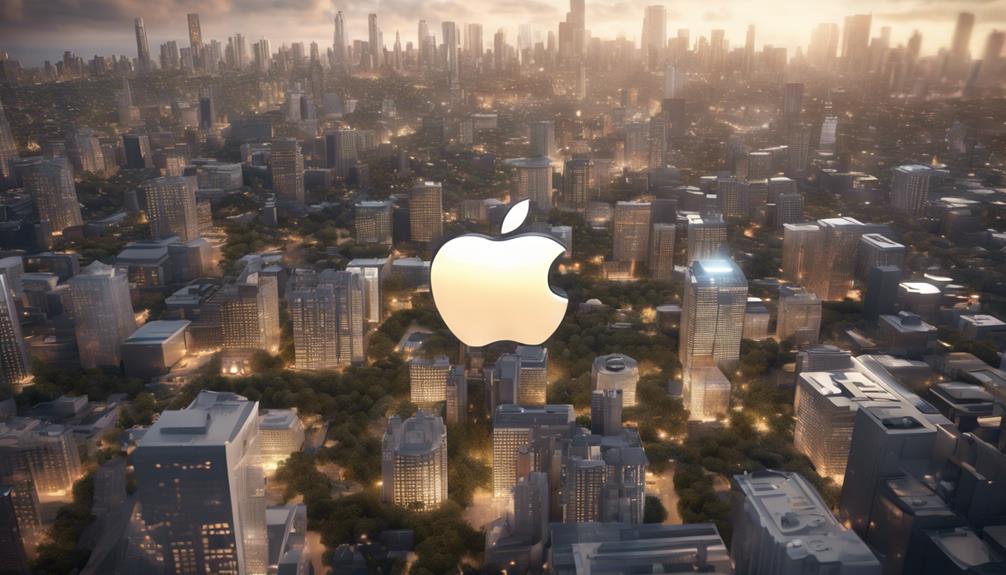
While Apple might not first come to mind as an AI stock, you'd be surprised by how deeply AI is woven into its fabric. From Siri's machine learning capabilities to the advanced Neural Engine in its A-series processors and M1 chips, AI is a core component of its innovation. AI drives enhancements in everything from your iPhone's camera to how you'll receive recommendations in Apple Music or TV+. Apple isn't just using AI; it's setting industry standards with its intelligent features and maintaining privacy with on-device processing. Exploring further, you'll uncover just how significant Apple's role is in shaping the AI landscape.
Apple's History With AI

Apple has consistently integrated AI into its products, enhancing user experience across its range of devices. You mightn't realize it, but you've been interacting with AI ever since you first asked Siri a question or sorted photos using facial recognition. This journey began in the early 2000s, subtly woven into the fabric of various software enhancements and user interface improvements.
As you've watched Apple evolve, AI has been at the heart of this transformation, though it wasn't always in the spotlight. Before AI became a buzzword, Apple was pioneering its use in creating seamless, intuitive interactions. Remember when predictive texting felt revolutionary? That was AI working quietly behind the scenes, learning from your typing habits.
Apple's commitment to AI isn't just about adding new features; it's about rethinking how technology fits into your life. They've aimed to make their devices not only smarter but also more understanding of your needs, often anticipating what you might want before you even know you want it.
This isn't just about making things easier or more fun; it's about fundamentally changing how you interact with your devices, turning them from tools into partners.
As you continue to use Apple products, AI is becoming an increasingly integral part of your daily interactions, subtly reshaping your digital experience.
Current AI Applications in Apple
Today's Apple devices leverage AI to streamline and personalize your experience, from real-time photo categorization to predictive text improvements. When you're using your iPhone or iPad, AI works silently in the background, enhancing everything from your interactions with Siri to the way your apps anticipate your needs.
Siri, Apple's voice assistant, uses advanced machine learning to better understand your commands and even predict what you might need next based on your habits.
Your photos app isn't just storing images; it's using AI to organize them. It recognizes faces, scenes, and objects, making it easier for you to find that one photo you're looking for without endless scrolling. Meanwhile, the Health app uses AI to provide personalized insights based on your activity data, potentially alerting you to health issues before they become serious.
On the entertainment front, Apple Music and TV+ use AI to recommend music and shows you'll love, learning from what you watch and listen to.
Even the News app utilizes AI to curate content tailored specifically to your interests, keeping you informed and engaged without overwhelming you with irrelevant information.
AI in Apple Hardware Innovations

Innovative AI technology is integrated into Apple's hardware, enhancing device performance and user interaction. As you delve deeper into their product lineup, you'll notice that Apple embeds AI in chips like the Neural Engine in their A-series processors. This specialized hardware accelerates machine learning tasks, allowing your iPhone or iPad to recognize patterns, make predictions, and learn from experiences much like the human brain.
Imagine taking photos with your iPhone; the AI in the hardware enables advanced computational photography. It's not just about capturing images; it's about enhancing them in real-time, adjusting lighting, and optimizing colors to make every shot look professional. This isn't software magic; it's the AI in the chip working seamlessly with the camera hardware.
Apple's commitment to AI doesn't stop at mobile devices. The M1 chip in Macs has an integrated Neural Engine that powers everything from voice recognition to data analysis, enabling faster, more efficient processing. This means your Mac isn't just running faster; it's adapting to your workflow, making tasks quicker and more intuitive.
Each innovation isn't just a step forward in technology; it's a leap towards making your daily interactions with technology smoother and more intuitive. Apple's hardware AI is more than a feature; it's the backbone of your device's intelligence.
Software and AI Integration
You'll find that Apple's software seamlessly integrates AI to create a more personalized and efficient user experience. As you navigate through your day, Siri, Apple's intelligent assistant, utilizes advanced machine learning models to understand your queries better and provide more relevant responses. It's not just about recognizing your voice; it's about understanding the context of your questions.
Moreover, Apple's Photos app uses AI to organize your pictures by faces and places, making it easier for you to find memories without tedious manual sorting. You don't have to spend hours tagging or categorizing; AI does it for you, learning from each interaction to improve its accuracy.
In the realm of privacy, you're benefiting from AI that works directly on your device, minimizing data sent to the cloud. This local processing ensures your personal information stays secure while still leveraging AI's power to enhance apps like Maps for real-time traffic predictions and route suggestions. Apple's approach shows that you can enjoy powerful AI features without compromising your data security.
Each update brings smarter functionalities embedded in your devices, simplifying tasks and enriching your digital interactions, all while keeping your convenience and security at the forefront.
Apple's AI Research Investments

Apple invests heavily in AI research to continually enhance the capabilities and efficiency of its products. You've likely seen the results in everything from your iPhone's ability to recognize your face to the seamless way Siri understands and processes your requests. These advancements are no coincidence; they're the outcome of deliberate and substantial investments in artificial intelligence.
Behind the scenes, Apple is funneling resources into developing smarter AI that can learn from interactions and improve over time. This means you get a more personalized and intuitive user experience. Whether it's through refining the algorithms that power Apple Maps or improving the predictive capabilities of your Apple Watch, the focus is clear: to make your devices not just tools, but smart companions.
Moreover, Apple's commitment to privacy ensures that this AI-driven personalization respects your data. By designing AI with privacy in mind, Apple ensures that your information stays secure, even as it provides increasingly sophisticated services.
Comparing Apple With AI Companies
While Apple's AI investments significantly enhance its product line, let's examine how it stacks up against dedicated AI companies.
When you consider firms like Google DeepMind, OpenAI, or IBM Watson, you'll notice they focus primarily on advancing AI technology itself, pioneering fields from natural language processing to autonomous decision-making systems. These companies invest a substantial portion of their resources directly into AI research and development, pushing boundaries of what AI can achieve.
In contrast, Apple integrates AI more as a feature enhancement across its existing products rather than the core product itself. Think about Siri, the AI assistant that's more about improving user experience on iPhones, iPads, and Macs, rather than pushing the envelope in AI theory or application.
This practical application of AI supports Apple's ecosystem, making its devices smarter and more intuitive, but doesn't necessarily place Apple at the forefront of AI innovation.
You'll find that while Apple's approach is certainly effective for its business model, focusing on consumer satisfaction and product integration, it doesn't quite match the AI-centric thrust of companies whose primary mission is to advance AI technology. This distinction is crucial when categorizing Apple in the broader AI landscape.
Apple's AI Influence on the Market

Despite not leading in AI innovation, Apple's strategic integration of AI technologies significantly shapes market dynamics. You've seen how their use of AI in devices like iPhones and iPads influences consumer expectations and sets new standards for user experience. Apple's approach, focusing on enhancing functionality and seamless integration, pushes other tech giants to follow suit, ensuring that AI becomes a core component of consumer electronics.
Their AI-powered features such as Face ID, Siri, and personalized recommendations in Apple Music or Apple TV have become benchmarks. These features aren't just about smart computing; they're about creating an ecosystem where device intelligence enhances daily convenience. This has led competitors to prioritize similar innovations to keep up, propelling a rapid advancement in AI applications across the board.
Moreover, Apple's privacy-centric approach to AI sets a unique tone in the market. By making privacy a key part of the AI conversation, they challenge other companies to develop AI solutions that respect user data. This shift isn't just ethical; it's strategic, influencing how industries adopt and implement AI technologies without compromising on consumer trust.
You observe how Apple, without being at the forefront of AI research, molds industry trends and operational standards through strategic AI incorporation, impacting how the market evolves and competitors react.
Investment Perspectives on Apple's AI
You've seen how Apple shapes industry standards; now consider how this influences your investment decisions in their AI capabilities. As Apple integrates AI more deeply into its products—from Siri enhancements to advanced machine learning in photo recognition—their tech becomes increasingly indispensable, which can be a strong point for potential investors like you.
Think about Apple's commitment to privacy and how it intertwines with AI. They're pioneering on-device AI, which processes data directly on your iPhone or iPad, rather than sending it to the cloud. This approach not only speeds up operations and preserves battery life but also appeals to privacy-conscious consumers, potentially boosting device loyalty and sales.
Moreover, Apple's control over its entire ecosystem—hardware, software, and services—allows for seamless integration of AI functionalities. This vertical integration can be a competitive edge, ensuring that Apple devices work better together, enhancing user experience, and driving further sales.
When considering Apple as an AI investment, reflect on their market position and ongoing research into AI. They're not just playing catch-up; they're aiming to redefine how AI is used in technology. Investing in Apple now could mean you're investing in a leader of tomorrow's AI-driven world.
Frequently Asked Questions
How Does Apple Ensure User Privacy With Its AI Technologies?
Apple safeguards your privacy by using on-device processing for AI tasks, minimizing data sent to servers. They also encrypt your information and strictly govern how it's accessed and used.
What Ai-Related Patents Does Apple Currently Hold?
You're curious about Apple's AI-related patents. They hold numerous patents, including those for machine learning processes, AI in photography, and voice recognition enhancements, showcasing their commitment to advancing AI technology.
Are There Ethical Concerns Associated With Apple's AI Developments?
You might wonder about ethical concerns with Apple's AI developments. Issues like privacy, data security, and algorithmic bias are significant. It's crucial to consider how these technologies impact user rights and freedoms.
How Does Apple's AI Impact Its Supply Chain Management?
Apple's AI significantly enhances its supply chain management by optimizing inventory levels, forecasting demand more accurately, and streamlining logistics. You'll notice improved efficiency and reduced operational costs, making their systems exceptionally responsive.
What AI Training Programs Does Apple Offer to Its Employees?
You're curious about Apple's AI training for employees. They offer various programs focusing on machine learning and AI applications to enhance their skills, fostering innovation across all departments within the company.
Conclusion
As you've seen, Apple is deeply integrated with AI, from its innovative hardware to its software solutions. Their commitment to AI research and development positions them comparably to dedicated AI companies, influencing the market significantly.
If you're considering an investment, Apple's robust AI integration suggests it's not just a tech stock, but also a compelling AI stock. This dual identity could provide a unique edge in your investment portfolio, blending technology with pioneering AI advancements.






